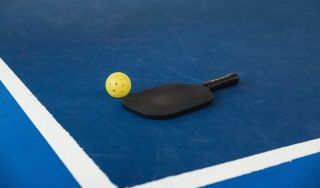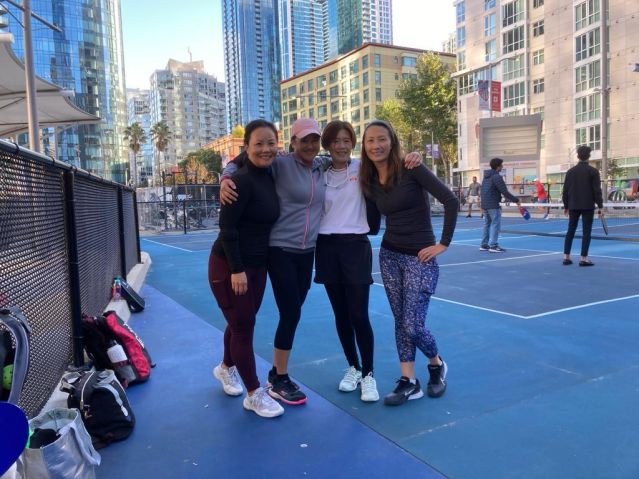Sport and Competition
The Potent and Powerful Pull of Pickleball
The potential for psychological health benefits is strong.
Updated January 10, 2024 Reviewed by Pam Dailey
Key points
- Pickleball appears to have mental health benefits as it encourages community building and mindfulness.
- Pickleball supports inclusivity of culturally diverse players across age ranges.
- Challenging personal perfectionism and providing praise to others are adaptive possibilities in pickleball.

This post is co-authored with Nina Del Prado.
Imagine:
- A 19-year-old college student from Mexico
- A 70-something, retired investment banker
- A 33-year-old AI data scientist from Pakistan
- An ER physician in the mid-40s
All playing a beloved sport, with each other?
Imagine no further.
This is the potent and powerful pull of pickleball.

In public courts or private clubs, in open spaces, wherever lines can be drawn and permanent or temporary nets set up, the ping and pull of pickleball have fast become a positive addiction for many, delightfully intertwining individuals from the most diverse aspects of society.
Potent Principles of Pickleball (And Its Benefit to General Well-being):
Preamble-Positive
It is general pickleball etiquette that players introduce themselves to other unknown players during “open court” play (players drop by courts, with hopes of playing with others, who also simply show up). Some extroverted picklers will often ask how long others have played, where else they play, etc. These positive preambles can set the stage for friendly, interactive exercise and sometimes for even longer-lasting friendships that would never happen otherwise.
Playful
Adults of all ages (think 18 to 70+) seem to tap into their inner child, perhaps reminded of their days on the school playground. Giggles, laughter, and squeals (accompanied by the occasional groan) often abound. Nostalgia and play increase positive emotions. Children can play too, creating a bonding experience with their peers as well as with parents.
Potpourri-Prevalent
Next to the pickler foursome previously mentioned (displaying age and professional diversity), is a 3-generation family, represented by a young teenage daughter/granddaughter, genX Mom, and genX Mom’s active parents at play! Indeed, pickleball invites a potpourri of players to engage with one another and can foster organic diversity.

Perfection: Not
A pickler can choose to “up” and strengthen their skills, or not. Those who consider themselves perfectionists, may use a “hall pass” or take a “perfectionist break” during play. With pickleball, some play simply to socialize with others. Picklers are generally welcomed, regardless of skill level.
Present-Focused
Somehow, picklers’ ills, stresses, and challenges are set aside during play. The need to focus on that plastic, fluorescent, hole-laden ball, keeps the worries away, if even for the short time it takes for a single or pair to reach 11 points. The here-and-now attention required during pickleball keeps unwanted thoughts in check.

Parting-Positive
As with the “positive preamble,” so too, does the game end on a pleasant note. When the players’ match is over and individuals part ways, the proverbial clinking of opponents’ and partner’s paddles is to be expected and, organically, is part of the game’s experience. The paddle “fist-bump” is a bonding ritual that emphasizes sportsmanship and reflects community-building.
Ping-Praising
Most non-players who know picklers would describe them as zealots who actively recruit other non-picklers to play, going on and on about pickleball’s wonders. Indeed, picklers positively praise (at times, preach) the lure of “the ping.” Pickleball brings joy on and off the court because chatting about the game gives almost as much entertainment as playing it.
Anti-picklers and naysayers may proclaim that pickleball is a phase and that the sport will fade when the next best fad comes along.
Only time will tell.
At a minimum, the pickleball phase is a life-affirming one that appears to be viscerally benefiting picklers’ well-being and, perhaps, spreads some moments of joy to picklers’ family members and friends too.
Long live the potent power of pickleball!
Nina Del Prado is an Executive Coach, who has specialized in the BioTech/Pharma industry in the San Francisco Bay Area for over 15 years. She is passionate about empowering her clients to increase self-awareness and sharpen their emotional and social intelligence skills in the workplace. She finds great joy in the social interactions and shared exercise that pickleball provides. Nina is Dr. Alicia Del Prado’s aunt, with whom she has co-consulted on culture and diversity-related projects.




